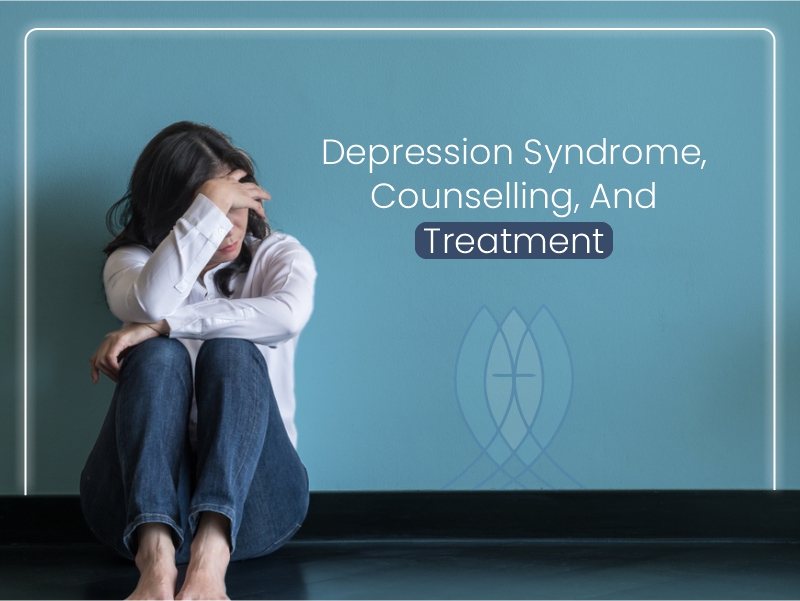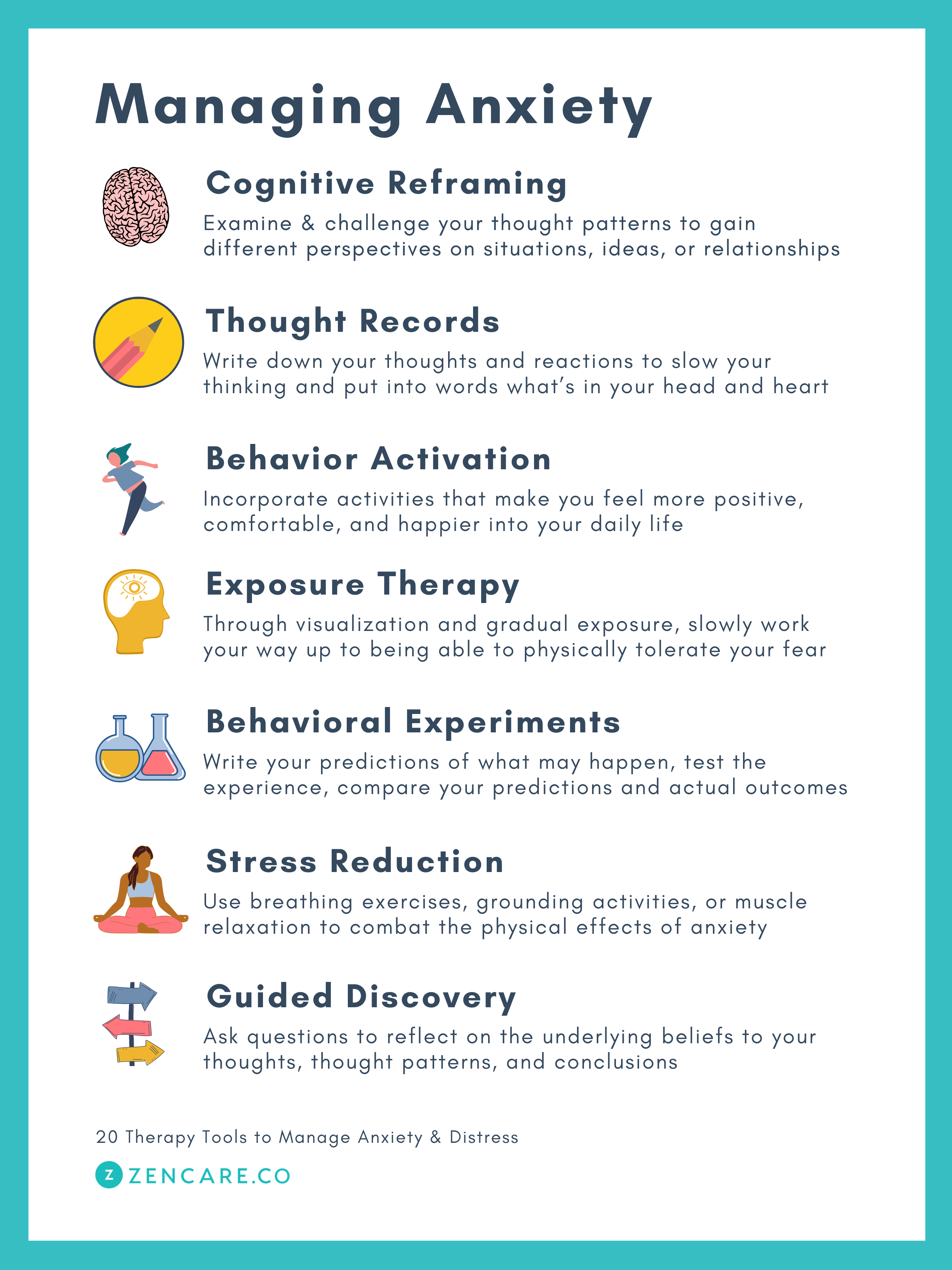Take the initial step toward healing with therapy for anxiety solutions
Discovering Different Techniques in Coaching for Anxiousness Disorder for Long Lasting Modification
When taking on stress and anxiety problems, it's necessary to discover a range of counseling strategies. Each method offers distinct understandings and tools to assist you handle your signs successfully. You could find that combining strategies can generate the very best outcomes. Nevertheless, understanding the nuances of these methods is crucial to promoting enduring change. What happens if the appropriate mix could release a new degree of emotional well-being for you?
Recognizing Stress And Anxiety Conditions: A Brief Review
Anxiousness disorders, which affect millions of individuals worldwide, can significantly influence day-to-day live. You could experience frustrating sensations of concern or fret that appear unmanageable. These feelings can bring about physical symptoms like an auto racing heart, sweating, or even dizziness. Typical kinds of stress and anxiety disorders include generalized stress and anxiety disorder, panic attack, and social anxiety condition. Each has distinct signs, but they all share a tendency to disrupt your routine and relationships.Understanding the origin of your anxiety is vital. It could stem from genes, mind chemistry, or life experiences. Acknowledging your triggers can assist you handle your actions better. It's essential to keep in mind that you're not the only one in this battle. Lots of people deal with comparable challenges, and seeking assistance is a solid action toward sensation better. By learning more about anxiousness conditions, you're currently on the path to understanding and handling your problem better.
Cognitive-Behavioral Therapy: Testing Unfavorable Thought Patterns
In Cognitive-Behavioral Treatment, you'll start by recognizing the negative thought activates that add to your anxiousness. As soon as you identify these ideas, you'll deal with changing them with more positive choices. Together, you'll construct efficient coping methods to help manage your anxiety in day-to-day situations.
Identifying Negative Idea Triggers

When you experience moments of distress, recognizing the specific triggers behind your adverse ideas can be necessary in taking care of anxiousness. Begin by focusing on circumstances that prompt feelings of worry or worry. Is it a jampacked room, an approaching due date, or a discussion with particular individuals? Take down these circumstances in a journal. This will help you identify patterns in your reasoning. Also, notice physical experiences that accompany your adverse thoughts, like a racing heart or rigidity in your breast. By pinpointing these triggers, you get insight into what's sustaining your anxiousness. Comprehending these links is the initial step in testing those thoughts and ultimately gaining back control over your emotional reactions.
Replacing Thoughts With Positives
Testing negative idea patterns is an essential action in changing your frame of mind and minimizing anxiousness. You may usually find on your own caught in cycles of insecurity or catastrophic reasoning. Rather of allowing these thoughts determine your feelings, method replacing them with positive affirmations or realistic alternatives. For instance, when you believe, "I can not manage this," move it to, "I can take care of challenges one action at once." This basic adjustment can substantially influence your mood. Consistently recognizing and responding to these negative thoughts helps create a much healthier inner dialogue. Remember, it requires time and effort, but regularly exercising this technique can cause long lasting change, empowering you to encounter anxiousness with restored self-confidence and durability.
Building Coping Strategies Together
Replacing unfavorable thoughts is only the beginning of taking care of anxiety successfully. To produce long lasting change, you require to develop coping approaches that encourage you. Cognitive-Behavioral Therapy (CBT) assists you determine and test those unhelpful idea patterns. Together, you and your therapist can explore just how these thoughts impact your sensations and behaviors.Start by establishing functional techniques, like journaling or mindfulness exercises, that permit you to challenge anxiousness head-on. When you encounter your anxieties progressively, you'll discover to react in different ways.

Mindfulness and Acceptance-Based Approaches: Cultivating Present-Moment Recognition
As you navigate the intricacies of stress and anxiety, including mindfulness and acceptance-based techniques can substantially boost your capacity to grow present-moment awareness. By focusing on the present moment, you'll locate that you can observe your ideas and sensations without judgment (Counseling services for anxiety). This practice assists you recognize your stress and anxiety without really feeling overwhelmed by it.Engaging in mindfulness exercises, such as deep breathing, body scans, or directed reflections, allows you to ground on your own in your current experience. Acceptance-based techniques motivate you to welcome your feelings instead of battle against them. They lose their power over you.Incorporating these techniques right into your day-to-day regimen can change exactly how you respond to anxiety when you accept your sensations. You'll develop strength and learn to browse demanding scenarios with higher convenience. Eventually, growing present-moment awareness lays the structure for enduring modification, empowering you to lead a more meeting life
Exposure Treatment: Challenging Fears Progressively
Exposure treatment helps you face your anxieties in a gradual means, making it less overwhelming. You'll discover methods to deal with anxiety-provoking situations detailed, while additionally constructing coping methods to handle your reactions. This technique empowers you to take control and reduce anxiety over time.
Gradual Exposure Strategies

When dealing with anxiety, gradually facing your anxieties can be an effective way to gain back control. This method, referred to as steady exposure, includes slowly revealing on your own to the scenarios or objects that trigger your stress and anxiety. Begin with much less challenging circumstances and gradually work your method as much as more difficult ones. For circumstances, if you hesitate of public talking, you may start by speaking in front of a mirror, then progress to sharing thoughts with a friend, and at some point deal with a small group. Each step aids desensitize you to the worry, building your confidence with time. Remember, it's necessary to pace yourself and celebrate tiny triumphes as you relocate with this process, reinforcing your ability to take care of anxiety properly.
Structure Coping Approaches
Structure efficient coping approaches is crucial for taking care of stress and anxiety, especially as you confront your concerns progressively - Counseling discover here services for anxiety. One effective technique is direct exposure therapy, where you begin by facing your worries in a regulated fashion. Begin with less frightening situations and gradually function your means approximately more challenging circumstances. This gradual direct exposure assists desensitize you to stress and anxiety sets off, making them much less overwhelming.Incorporate relaxation methods, such as deep breathing or mindfulness, to calm your mind throughout exposure. Track your development, commemorating small success along the method to increase your self-confidence. Keep in mind, it's fine to take your time; the goal isn't excellence but steady improvement. By building these techniques, you'll equip on your own to navigate stress and anxiety and accept life a lot more fully
Psychodynamic Therapy: Revealing Origin Causes of Stress And Anxiety
Psychodynamic therapy discovers the subconscious mind, disclosing the origin of your anxiousness. By analyzing your ideas, sensations, and previous experiences, this approach helps you discover underlying disputes and unsettled problems that might add to your present anxiousness. You'll collaborate with a therapist to explore childhood experiences, partnerships, and emotional patterns that form your actions today.As you acquire understanding right into these much deeper layers of your subconscious, you'll start to identify just how past events influence your existing behavior. This understanding can lead to catharsis, permitting you to process feelings you might have suppressed.Through the restorative partnership, you can additionally identify defense reaction that might have created gradually, supplying a clearer about his course to alter. Eventually, psychodynamic therapy equips you with the devices to address your anxiousness at its core, advertising long lasting transformation in your psychological health.
Integrative and Alternative Approaches: Incorporating Techniques for Greater Effectiveness
Incorporating different healing methods can enhance your journey towards managing anxiety better. By combining components from cognitive-behavioral treatment, mindfulness practices, and alternative strategies, you can produce a customized method that resolves your unique needs. You may make use of cognitive-behavioral techniques to challenge adverse idea patterns while including mindfulness exercises to ground yourself in the present moment.Additionally, exploring holistic methods such as yoga exercise or reflection can advertise leisure and decrease anxiety signs and symptoms. This blend allows you to develop better self-awareness and resilience.Experimenting with these varied approaches can help you discover what resonates most with you. Keep in mind, it has to do with locating a harmony that functions, rather than adhering to a single approach. This integrative technique not just provides prompt alleviation but additionally fosters long-lasting skills for managing stress and anxiety, empowering you to redeem control over your life.
The Duty of Support Solutions: Building Resilience With Connection
While it could appear that managing stress and anxiety is a singular journey, having a strong assistance system can play a vital role in your durability. Surrounding yourself with compassionate buddies, family, or assistance teams develops a risk-free room where you can openly share your experiences and feelings. When you get in touch with others, you advise on your own that you're not the only one in this struggle.These connections offer inspiration and can offer useful coping methods that have actually worked for others. It's likewise a possibility to obtain perspective; good friends can assist you see scenarios in a different way, minimizing sensations of isolation.Moreover, emotional assistance fosters a sense of belonging, which can substantially relieve anxiousness symptoms. By leaning on your assistance system, you can develop durability and deal with obstacles much more effectively. Remember, getting to out for aid signifies strength, and it can make all the difference in your journey towards taking care of stress and anxiety.
Often Asked Inquiries
What Are the Usual Signs And Symptoms of Anxiousness Problems?
You could experience restlessness, tiredness, trouble concentrating, impatience, muscular tissue stress, and rest disruptions. Physical signs can consist of fast heartbeat, sweating, and shivering. Recognizing these signs early can assist you look for suitable assistance and therapy.
How Much Time Does Treatment Usually Last for Stress And Anxiety Conditions?
Treatment for stress and anxiety conditions generally lasts anywhere from a few weeks to a number of months. It really depends upon your private needs, progress, and the strategies your therapist uses to help you manage your stress and anxiety successfully.
Can Medicine Be Utilized Along With Treatment for Stress and anxiety?
Yes, medication can absolutely be utilized alongside therapy for stress and anxiety. Incorporating both approaches typically boosts treatment performance, aiding you manage symptoms while checking out underlying concerns with therapy (Counseling services for anxiety). Constantly consult your healthcare company Recommended Reading for personalized guidance
Exist Self-Help Techniques for Managing Anxiety?
Yes, there are a number of self-help approaches for managing anxiousness. You can exercise mindfulness, participate in normal workout, preserve a well balanced diet plan, establish a routine, and utilize deep breathing strategies to help in reducing anxiousness signs and symptoms properly.
How Do I Know if I Need Professional Aid for Anxiousness?
